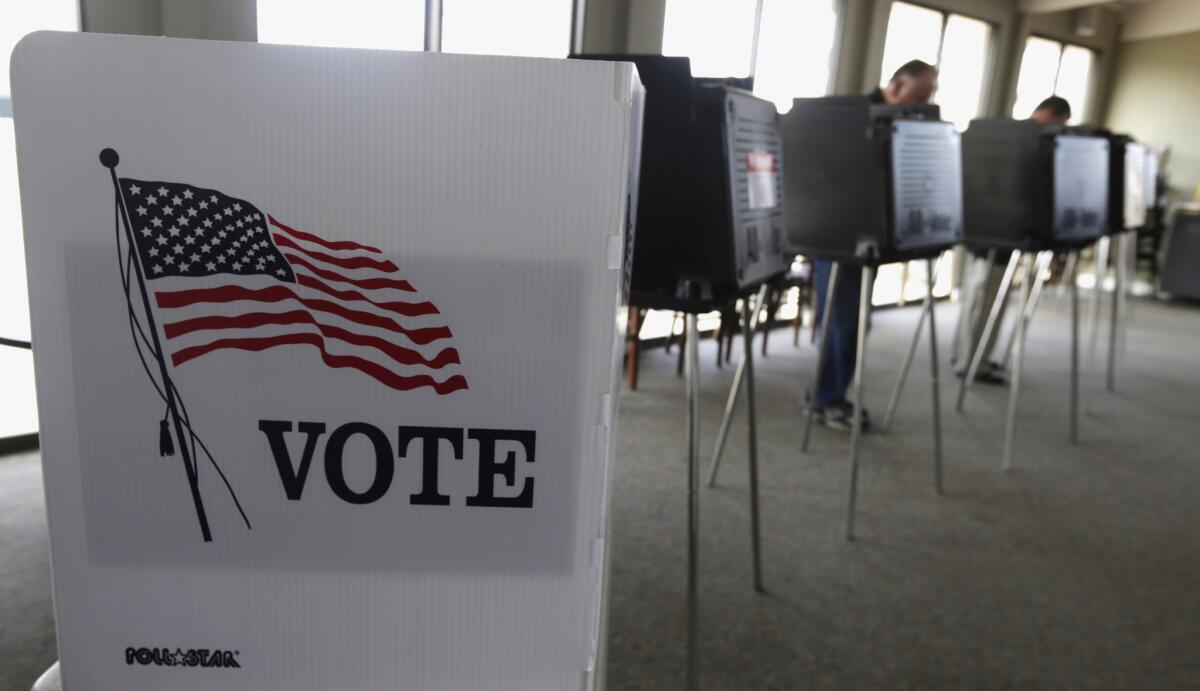Op-Ed: Sick of political polls? Try prediction markets

Let me make a bold prediction: You would badly like to know how the election on Nov. 8 will turn out, and you are searching for signs capable of revealing the near future.
If you’re a romantic, you may fixate on crowd-size estimates or height comparisons. (Most often, the taller candidate wins.) But you probably want something more scientific-seeming. You might therefore turn to national polls, or poll aggregation sites, or models that extract a precise probability estimate from all that polling data.
What if you want an edge beyond what these number-pushers can provide?
A hybrid between sports betting and derivatives markets, these allow traders to buy and sell shares that will pay out if a certain political event occurs.
You might turn to political prediction markets. A hybrid between sports betting and derivatives markets, these allow traders to buy and sell shares that will pay out if a certain political event occurs (e.g., Donald Trump wins the 2016 presidential election.) This is more flexible than a one-time bet: You might buy shares in the Republican to win the presidency at 25 cents on the dollar one month but decide to sell them for 35 cents the next, meaning that you can extract value without having to “win” any particular bet. If prediction markets were perfect, then Republican-to-win shares trading at 35 cents would straightforwardly indicate a 35% chance that a Republican would win.
Do these markets provide a better indicator of the candidates’ real chances than the various fancy models? Should we believe the wisdom of the crowds — especially if those crowds are willing to back up their beliefs with their hard-earned cash?
First, some background. Since Congress passed the Unlawful Internet Gambling Enforcement Act of 2006, it has been mostly illegal for U.S. citizens to engage in Internet betting on politics or anything else. There are, however, a couple of exceptions. The Iowa Electronic Markets, run by the University of Iowa’s business school, gets a pass from government enforcers because it limits investments to $500 and does not take a huge cut like a seedy gambling joint. All it takes is a one-time $5 fee to open an account.
A more recent entrant is PredictIt, based at Victoria University in New Zealand, which limits investments to $850 and claims to have put its legal ducks in a row for U.S. citizens. It takes a 10% cut of all trading profits.
Here’s the problem: Because of the legal impediments, these markets are small and shallow. IEM’s winner-take-all market has just over $92,000 at risk. PredictIt is somewhat larger and more active, with something like $1 million in its individual market, but that is still not much money in the grand scheme of things. Unlike the prices in commodities or equity markets, there is no reason to think of prices in these markets as reflecting all of the best information available; instead, they reflect the judgments of niche communities.
As a result of their small size, moreover, these markets can experience wild short-term price swings just because a few people decide to impatiently buy or sell like crazy. Other traders gladly will take this “dumb money,” but corrections aren’t always as fast as you might expect. Any spikes or dips in prices should therefore be treated skeptically.
Another, more important problem is that it isn’t clear whether these markets end up incorporating any novel data. We want these prediction markets to be crystal balls, but more often, they mirror information already prominently featured in the news media — mostly, the same old polls. I found a correlation of 0.82 (quite high) between a smoothed average of the IEM’s main presidential market and FiveThirtyEight.com’s Polls-Only model. That means they usually move together, though movements on the market are notably more muted.
Perhaps we shouldn’t hold this against the markets. After all, polling results are probably our most useful stream of fresh data; in 2008 and 2012, the markets followed the polls in producing high probabilities for the (eventually correct) predictions that Barack Obama would triumph. But if people expect prediction markets in their current state to be some kind of boldly countervailing indicator, they are likely to be disappointed.
There are other reasons to like prediction markets, though. Having to quantify one’s instincts, and back up professions of confidence with actual money — even just a little bit — is extremely clarifying and humbling. Unlike a bet that is fixed in time forever, trading on an active market invites you to reconsider your views as maintaining them becomes expensive. For providing such epistemic services, we should be grateful to prediction markets — and call for their widespread legality — whatever their record as oracles.
Philip Wallach is a senior fellow in governance studies at the Brookings Institution.
Follow the Opinion section on Twitter @latimesopinion and Facebook
More to Read
A cure for the common opinion
Get thought-provoking perspectives with our weekly newsletter.
You may occasionally receive promotional content from the Los Angeles Times.










